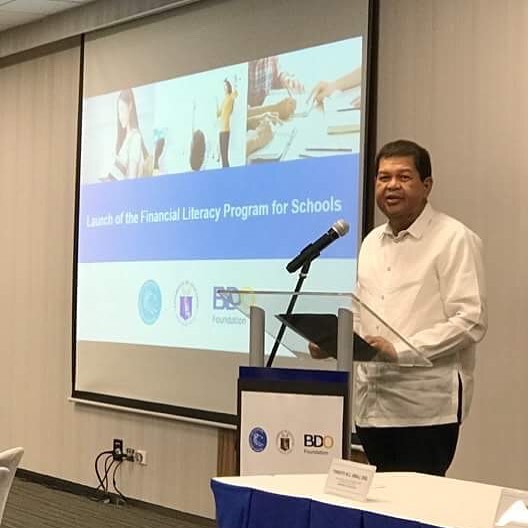Business and Economy
Espenilla discounts off-cycle action ahead of policy meeting

FILE: BSP Governor Nestor A. Espenilla, Jr. at the launch of financial literacy program for schools, in partnership with the DepEd Philippines and BDO Foundation. (Photo: Bangko Sentral ng Pilipinas/Facebook)
MANILA — Bangko Sentral ng Pilipinas (BSP) Governor Nestor A. Espenilla Jr. discounted any off-cycle actions ahead of the Monetary Board’s (MB) meeting on September 27 despite the impact of inflation which may have been exacerbated by the wrath of Typhoon Ompong (Mangkhut).
“We will follow the regular cycle,” he told reporters Monday, but noted the possibility of a “strong monetary action” during the MB’s sixth rate setting late this month.
To date, the Board has increased the BSP’s key rates by 100 basis points as inflation continue to rise.
The MB is widely expected to announce another rate increase as inflation remains elevated.
Last August, rate of price increases went up to 6.4 percent from month-ago’s 5.7 percent on faster inflation rate of the food index, among others, due to supply-side factors.
To date, inflation averaged at 4.8 percent, way higher than the upper end of government’s two to four percent target until 2020.
Inflation is seen to further rise due to the damage caused by Typhoon Ompong.
Espenilla said it is still “too early to tell the damage it caused and what the impact (is).”
“Historically, typhoons cause disruptions in supply but the impact tends to be localized and transitory. So I don’t think it will create a problem on inflation for a longer horizon,” he explained.
The central bank chief, however, pointed out that that “for the main inflation problem we’re dealing with right now, several measures have already been announced, non-monetary and monetary measures, so we continue along with those.”
Economic managers have identified nine measures to address supply-related issues on rice, fish, meat, and vegetables as lack of supply of these items is the primary factor that have been pushing inflation to multiyear high in recent months.
Included in these measures are the release of around 4.6 million sacks of rice currently available in National Food Authority (NFA) warehouses, replicating of issuance of certificates of necessity to allow fish imports to be distributed in wet markets around Metro Manila and other parts of the country, issuance of an Executive Order (EO) that will simplify and streamline licensing procedures for NFA’s rice imports, reduction of gap between farmgate and retail price of chicken, importation of sugar to direct users and for the Bureau of Customs (BOC) to prioritize the release of essential food items in the ports.
Economic managers said a draft EO for these measures has been submitted to the Office of the President and once signed the measures will be immediately implemented.





















